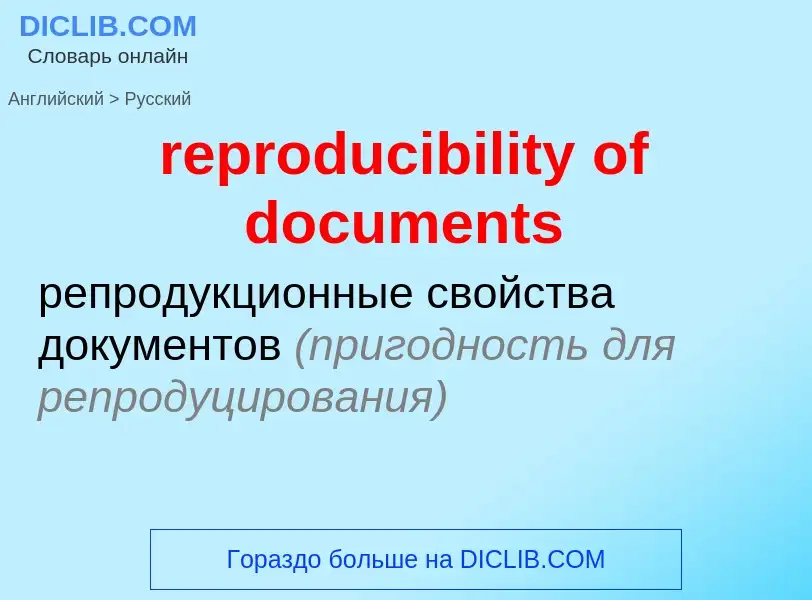Перевод и анализ слов искусственным интеллектом ChatGPT
На этой странице Вы можете получить подробный анализ слова или словосочетания, произведенный с помощью лучшей на сегодняшний день технологии искусственного интеллекта:
- как употребляется слово
- частота употребления
- используется оно чаще в устной или письменной речи
- варианты перевода слова
- примеры употребления (несколько фраз с переводом)
- этимология
reproducibility of documents - перевод на русский
медицина
воспроизводимость результатов
[ri:prədju:sə'biliti]
общая лексика
воспроизводимость
размножаемость
строительное дело
воспроизводимость (напр. результатов испытаний)
существительное
специальный термин
воспроизводимость или сходимость результатов
['replikəb(ə)l]
прилагательное
общая лексика
повторимый
воспроизводимый
общая лексика
невоспроизводимый
Определение
.
Википедия

Historical documents are original documents that contain important historical information about a person, place, or event and can thus serve as primary sources as important ingredients of the historical methodology.
Significant historical documents can be deeds, laws, accounts of battles (often given by the victors or persons sharing their viewpoint), or the exploits of the powerful. Though these documents are of historical interest, they do not detail the daily lives of ordinary people, or the way society functioned. Anthropologists, historians and archeologists generally are more interested in documents that describe the day-to-day lives of ordinary people, indicating what they ate, their interaction with other members of their households and social groups, and their states of mind. It is this information that allows them to try to understand and describe the way society was functioning at any particular time in history. Greek ostraka provide good examples of historical documents from "among the common people".
Many documents that are produced today, such as personal letters, pictures, contracts, newspapers, and medical records, would be considered valuable historical documents in the future. However most of these will be lost in the future since they are either printed on ordinary paper which has a limited lifespan, or even stored in digital formats, then lost track over time.
Some companies and government entities are attempting to increase the number of documents that will survive the passage of time, by taking into account the preservation issues, and either printing documents in a manner that would increase the likelihood of them surviving indefinitely, or placing selected documents in time capsules or other special storage environments.


![A [[Gutenberg Bible]] printed in the 1450s on display at the US Library of Congress A [[Gutenberg Bible]] printed in the 1450s on display at the US Library of Congress](https://commons.wikimedia.org/wiki/Special:FilePath/Gutenberg Bible.jpg?width=200)

